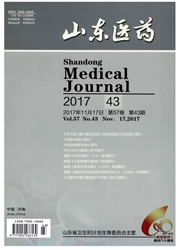

 中文摘要:
中文摘要:
目的分析成人急性淋巴细胞白血病(ALL)的远期预后及其影响因素。方法选择初诊成人ALL患者147例,根据初诊时WBC数、染色体核型及对诱导治疗反应等因素分为标危组53例、高危组94例(包括Ph+ALL36例、Ph-ALL 58例),对两组临床疗效及生存情况进行分析。对55例保存骨髓标本患者行p53、NOTCH1、IKZF1-IK6基因热点突变位点检测,分析突变发生率。单因素分析成人ALL患者的预后影响因素。结果治疗1个疗程,所有患者诱导缓解率为91.8%,3年无事件生存(EFS)率和总生存(OS)率分别为(37.4±4.1)%和(46.1±4.2)%;5年EFS率和OS率分别为(29.9±4.1)%和(39.9±4.3)%。标危组3、5年OS率高于高危组Ph+ALL者及Ph-ALL者(P均<0.05)。p53、NOTCH1、IKZF1-IK6基因突变发生率分别为1.82%、3.63%、32.73%。单因素分析显示,发病年龄、初诊时WBC数、Ph染色体情况为成人ALL患者的预后影响因素(P均<0.05);IKZF1-IK6异构体突变阳性者生存率略低于其阴性者(P>0.05)。结论成人ALL患者远期预后较差,尤其是高危ALL患者。发病年龄、初诊时WBC数、存在Ph染色体为成人ALL的预后影响因素,IKZF1-IK6异构体突变也可能是成人ALL患者的预后影响因素。
 英文摘要:
英文摘要:
Objective To analyze the long-term prognosis and influencing factors of acute lymphoblastic leukemia ( ALL) in adult patients.Methods A total of 147 newly diagnosed adult ALL patients were divided into the standard risk group (n=53) and the high risk group (n=94) (including 36 case of Ph+ALL group and 58 cases of Ph-ALL group) based on white blood cell ( WBC) counts, karyotypes and the responses to induction therapy.The therapeutic effectiveness and the survival rate were evaluated.Mutation hot spots in p53, NOTCH1 and IKZF1-IK6 were tested in 55 patients at the time of diagnosis or relapse (2 patients).The frequency and prognostic factors of these mutations were studied by univariate analysis.Results The rate of remission induction in all patients was 91.8%.The 3-year and 5-year overall survival ( OS) rates were (46.1 ±4.2)%and (39.9 ±4.3)%,respectively.The 3-year and 5-year event-free survival (EFS) rates were (37.4 ±4.1)%and (29.9 ±4.1)%, respectively.The 3-year OS rate and the 5-year OS rate of the standard risk group were higher than those of the Ph+ALL group and Ph-ALL group (all P<0.05).The frequencies of p53, NOTCH1 and IKZF1-IK6 mutations were 1.82%, 3.63%and 32.73%, respectively.The univariate analysis suggested that age of on-set, WBC counts and the Philadelphia chromosome were prognostic factors for adult ALL (all P<0.05).It seems that the patients with high expression of IKZF1-IK6 isoform had slightly lower OS rate than that of low or negative expression, but it had no significant difference (P>0.05).Conclusions Adult ALL, especially high-risk ALL has poor long-term progno-sis.The age of onset, high WBC counts and the presence of Philadelphia chromosome are prognostic factors for adult ALL. Meanwhile, the high expression of IKZF1-IK6 isoform in adult ALL may also be a prognostic factor for adult ALL.
 同期刊论文项目
同期刊论文项目
 同项目期刊论文
同项目期刊论文
 期刊信息
期刊信息
